Corporate Social Responsibility Report: Tesco's CSR Analysis
VerifiedAdded on 2020/02/05
|8
|1929
|50
Report
AI Summary
This report delves into the concept of Corporate Social Responsibility (CSR), defining it as the voluntary activities undertaken by organizations for economic, social, and environmental sustainability. It examines the perspectives of key theorists like Milton Friedman, Harold Mintzberg, and Archie Carroll. The report explores the roles of shareholders and stakeholders, ethical consumers, and the importance of brand image and 'enlightened self-interest.' It then analyzes the arguments for and against CSR. The report includes a case study of Tesco, evaluating its positive and negative impacts, measures taken to enhance its brand image, and future CSR commitments. The significance of CSR in today's corporate environment is also discussed, with a conclusion summarizing the key findings and references to the sources used.

CSR
Paraphrase This Document
Need a fresh take? Get an instant paraphrase of this document with our AI Paraphraser
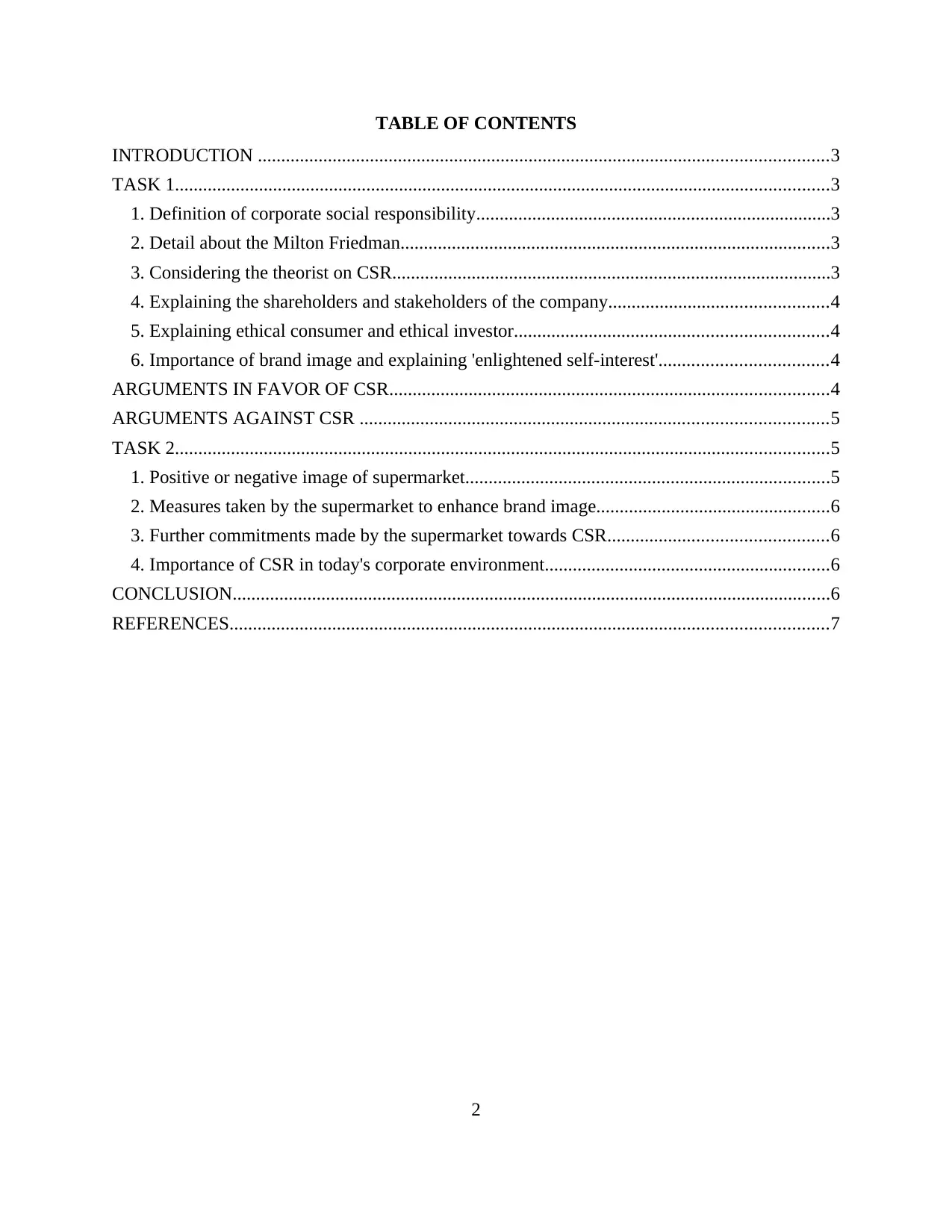
TABLE OF CONTENTS
INTRODUCTION ..........................................................................................................................3
TASK 1............................................................................................................................................3
1. Definition of corporate social responsibility............................................................................3
2. Detail about the Milton Friedman............................................................................................3
3. Considering the theorist on CSR..............................................................................................3
4. Explaining the shareholders and stakeholders of the company...............................................4
5. Explaining ethical consumer and ethical investor...................................................................4
6. Importance of brand image and explaining 'enlightened self-interest'....................................4
ARGUMENTS IN FAVOR OF CSR..............................................................................................4
ARGUMENTS AGAINST CSR ....................................................................................................5
TASK 2............................................................................................................................................5
1. Positive or negative image of supermarket..............................................................................5
2. Measures taken by the supermarket to enhance brand image..................................................6
3. Further commitments made by the supermarket towards CSR...............................................6
4. Importance of CSR in today's corporate environment.............................................................6
CONCLUSION................................................................................................................................6
REFERENCES................................................................................................................................7
2
INTRODUCTION ..........................................................................................................................3
TASK 1............................................................................................................................................3
1. Definition of corporate social responsibility............................................................................3
2. Detail about the Milton Friedman............................................................................................3
3. Considering the theorist on CSR..............................................................................................3
4. Explaining the shareholders and stakeholders of the company...............................................4
5. Explaining ethical consumer and ethical investor...................................................................4
6. Importance of brand image and explaining 'enlightened self-interest'....................................4
ARGUMENTS IN FAVOR OF CSR..............................................................................................4
ARGUMENTS AGAINST CSR ....................................................................................................5
TASK 2............................................................................................................................................5
1. Positive or negative image of supermarket..............................................................................5
2. Measures taken by the supermarket to enhance brand image..................................................6
3. Further commitments made by the supermarket towards CSR...............................................6
4. Importance of CSR in today's corporate environment.............................................................6
CONCLUSION................................................................................................................................6
REFERENCES................................................................................................................................7
2
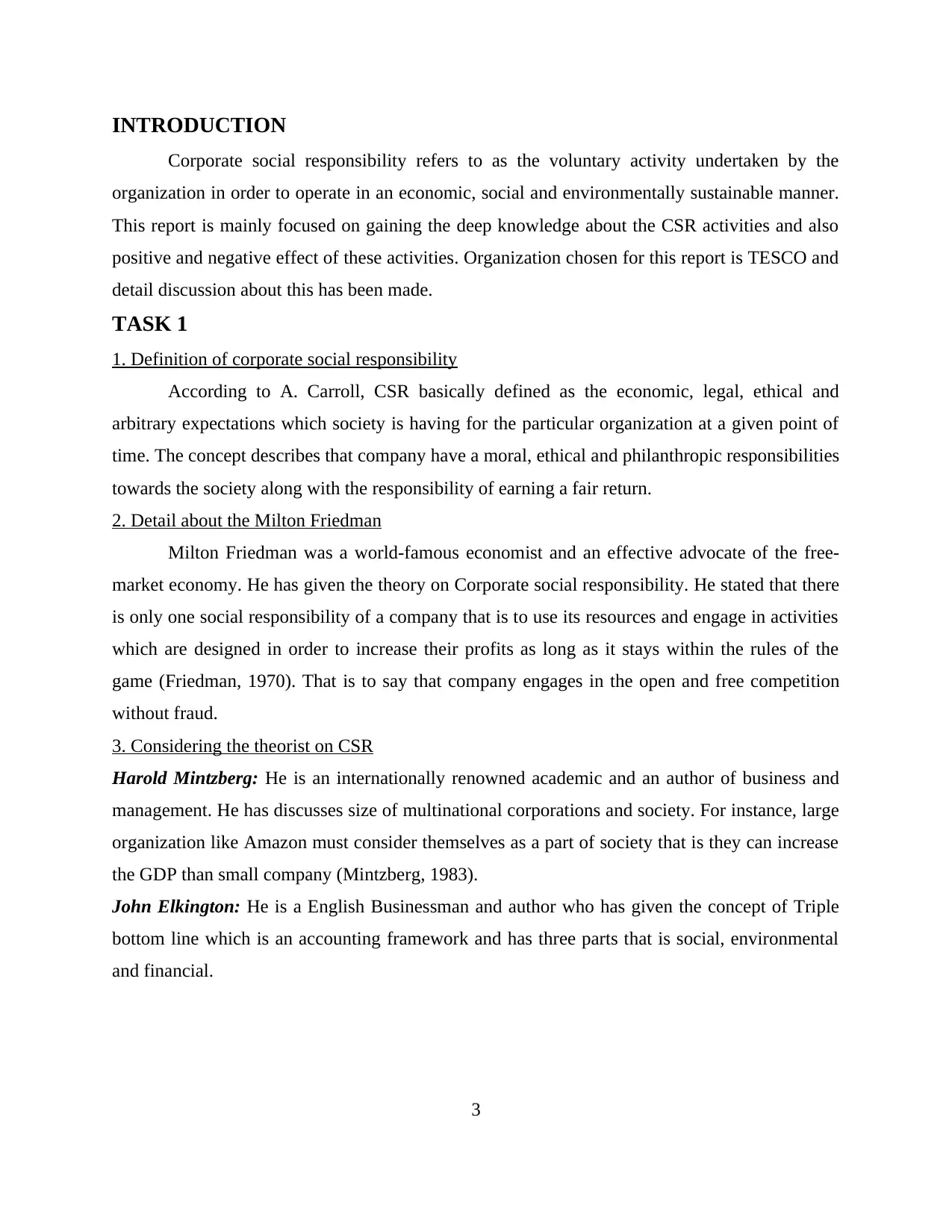
INTRODUCTION
Corporate social responsibility refers to as the voluntary activity undertaken by the
organization in order to operate in an economic, social and environmentally sustainable manner.
This report is mainly focused on gaining the deep knowledge about the CSR activities and also
positive and negative effect of these activities. Organization chosen for this report is TESCO and
detail discussion about this has been made.
TASK 1
1. Definition of corporate social responsibility
According to A. Carroll, CSR basically defined as the economic, legal, ethical and
arbitrary expectations which society is having for the particular organization at a given point of
time. The concept describes that company have a moral, ethical and philanthropic responsibilities
towards the society along with the responsibility of earning a fair return.
2. Detail about the Milton Friedman
Milton Friedman was a world-famous economist and an effective advocate of the free-
market economy. He has given the theory on Corporate social responsibility. He stated that there
is only one social responsibility of a company that is to use its resources and engage in activities
which are designed in order to increase their profits as long as it stays within the rules of the
game (Friedman, 1970). That is to say that company engages in the open and free competition
without fraud.
3. Considering the theorist on CSR
Harold Mintzberg: He is an internationally renowned academic and an author of business and
management. He has discusses size of multinational corporations and society. For instance, large
organization like Amazon must consider themselves as a part of society that is they can increase
the GDP than small company (Mintzberg, 1983).
John Elkington: He is a English Businessman and author who has given the concept of Triple
bottom line which is an accounting framework and has three parts that is social, environmental
and financial.
3
Corporate social responsibility refers to as the voluntary activity undertaken by the
organization in order to operate in an economic, social and environmentally sustainable manner.
This report is mainly focused on gaining the deep knowledge about the CSR activities and also
positive and negative effect of these activities. Organization chosen for this report is TESCO and
detail discussion about this has been made.
TASK 1
1. Definition of corporate social responsibility
According to A. Carroll, CSR basically defined as the economic, legal, ethical and
arbitrary expectations which society is having for the particular organization at a given point of
time. The concept describes that company have a moral, ethical and philanthropic responsibilities
towards the society along with the responsibility of earning a fair return.
2. Detail about the Milton Friedman
Milton Friedman was a world-famous economist and an effective advocate of the free-
market economy. He has given the theory on Corporate social responsibility. He stated that there
is only one social responsibility of a company that is to use its resources and engage in activities
which are designed in order to increase their profits as long as it stays within the rules of the
game (Friedman, 1970). That is to say that company engages in the open and free competition
without fraud.
3. Considering the theorist on CSR
Harold Mintzberg: He is an internationally renowned academic and an author of business and
management. He has discusses size of multinational corporations and society. For instance, large
organization like Amazon must consider themselves as a part of society that is they can increase
the GDP than small company (Mintzberg, 1983).
John Elkington: He is a English Businessman and author who has given the concept of Triple
bottom line which is an accounting framework and has three parts that is social, environmental
and financial.
3
⊘ This is a preview!⊘
Do you want full access?
Subscribe today to unlock all pages.

Trusted by 1+ million students worldwide
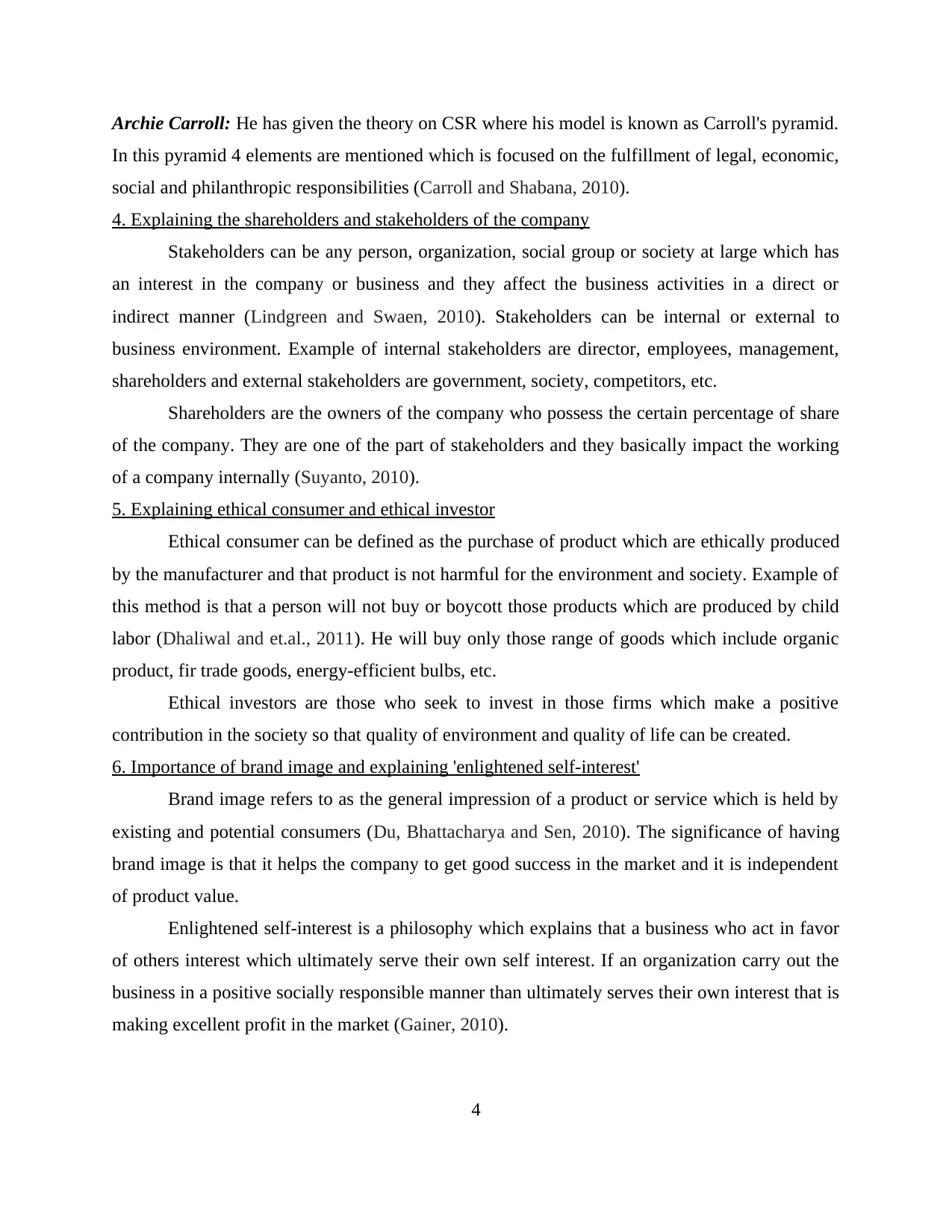
Archie Carroll: He has given the theory on CSR where his model is known as Carroll's pyramid.
In this pyramid 4 elements are mentioned which is focused on the fulfillment of legal, economic,
social and philanthropic responsibilities (Carroll and Shabana, 2010).
4. Explaining the shareholders and stakeholders of the company
Stakeholders can be any person, organization, social group or society at large which has
an interest in the company or business and they affect the business activities in a direct or
indirect manner (Lindgreen and Swaen, 2010). Stakeholders can be internal or external to
business environment. Example of internal stakeholders are director, employees, management,
shareholders and external stakeholders are government, society, competitors, etc.
Shareholders are the owners of the company who possess the certain percentage of share
of the company. They are one of the part of stakeholders and they basically impact the working
of a company internally (Suyanto, 2010).
5. Explaining ethical consumer and ethical investor
Ethical consumer can be defined as the purchase of product which are ethically produced
by the manufacturer and that product is not harmful for the environment and society. Example of
this method is that a person will not buy or boycott those products which are produced by child
labor (Dhaliwal and et.al., 2011). He will buy only those range of goods which include organic
product, fir trade goods, energy-efficient bulbs, etc.
Ethical investors are those who seek to invest in those firms which make a positive
contribution in the society so that quality of environment and quality of life can be created.
6. Importance of brand image and explaining 'enlightened self-interest'
Brand image refers to as the general impression of a product or service which is held by
existing and potential consumers (Du, Bhattacharya and Sen, 2010). The significance of having
brand image is that it helps the company to get good success in the market and it is independent
of product value.
Enlightened self-interest is a philosophy which explains that a business who act in favor
of others interest which ultimately serve their own self interest. If an organization carry out the
business in a positive socially responsible manner than ultimately serves their own interest that is
making excellent profit in the market (Gainer, 2010).
4
In this pyramid 4 elements are mentioned which is focused on the fulfillment of legal, economic,
social and philanthropic responsibilities (Carroll and Shabana, 2010).
4. Explaining the shareholders and stakeholders of the company
Stakeholders can be any person, organization, social group or society at large which has
an interest in the company or business and they affect the business activities in a direct or
indirect manner (Lindgreen and Swaen, 2010). Stakeholders can be internal or external to
business environment. Example of internal stakeholders are director, employees, management,
shareholders and external stakeholders are government, society, competitors, etc.
Shareholders are the owners of the company who possess the certain percentage of share
of the company. They are one of the part of stakeholders and they basically impact the working
of a company internally (Suyanto, 2010).
5. Explaining ethical consumer and ethical investor
Ethical consumer can be defined as the purchase of product which are ethically produced
by the manufacturer and that product is not harmful for the environment and society. Example of
this method is that a person will not buy or boycott those products which are produced by child
labor (Dhaliwal and et.al., 2011). He will buy only those range of goods which include organic
product, fir trade goods, energy-efficient bulbs, etc.
Ethical investors are those who seek to invest in those firms which make a positive
contribution in the society so that quality of environment and quality of life can be created.
6. Importance of brand image and explaining 'enlightened self-interest'
Brand image refers to as the general impression of a product or service which is held by
existing and potential consumers (Du, Bhattacharya and Sen, 2010). The significance of having
brand image is that it helps the company to get good success in the market and it is independent
of product value.
Enlightened self-interest is a philosophy which explains that a business who act in favor
of others interest which ultimately serve their own self interest. If an organization carry out the
business in a positive socially responsible manner than ultimately serves their own interest that is
making excellent profit in the market (Gainer, 2010).
4
Paraphrase This Document
Need a fresh take? Get an instant paraphrase of this document with our AI Paraphraser
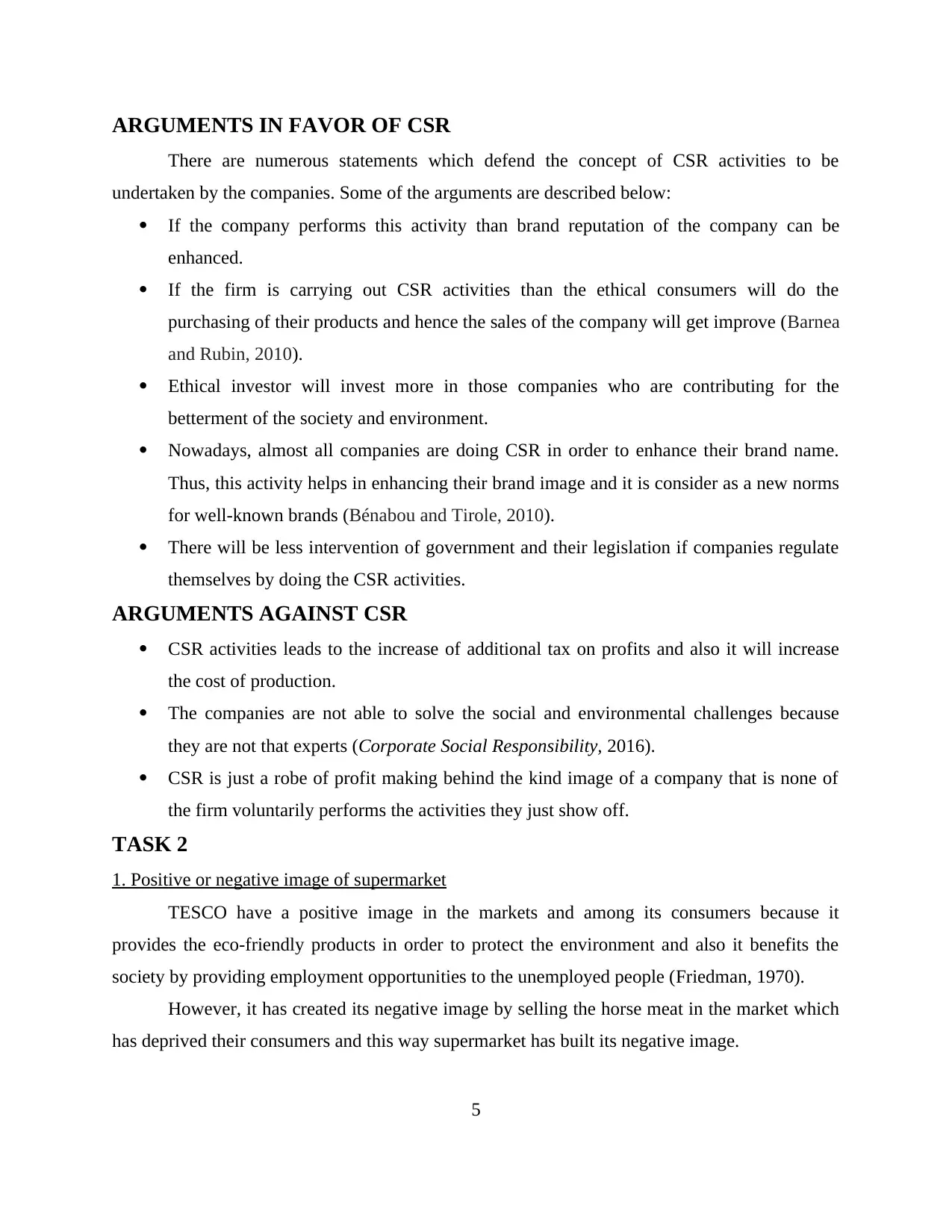
ARGUMENTS IN FAVOR OF CSR
There are numerous statements which defend the concept of CSR activities to be
undertaken by the companies. Some of the arguments are described below:
If the company performs this activity than brand reputation of the company can be
enhanced.
If the firm is carrying out CSR activities than the ethical consumers will do the
purchasing of their products and hence the sales of the company will get improve (Barnea
and Rubin, 2010).
Ethical investor will invest more in those companies who are contributing for the
betterment of the society and environment.
Nowadays, almost all companies are doing CSR in order to enhance their brand name.
Thus, this activity helps in enhancing their brand image and it is consider as a new norms
for well-known brands (Bénabou and Tirole, 2010).
There will be less intervention of government and their legislation if companies regulate
themselves by doing the CSR activities.
ARGUMENTS AGAINST CSR
CSR activities leads to the increase of additional tax on profits and also it will increase
the cost of production.
The companies are not able to solve the social and environmental challenges because
they are not that experts (Corporate Social Responsibility, 2016).
CSR is just a robe of profit making behind the kind image of a company that is none of
the firm voluntarily performs the activities they just show off.
TASK 2
1. Positive or negative image of supermarket
TESCO have a positive image in the markets and among its consumers because it
provides the eco-friendly products in order to protect the environment and also it benefits the
society by providing employment opportunities to the unemployed people (Friedman, 1970).
However, it has created its negative image by selling the horse meat in the market which
has deprived their consumers and this way supermarket has built its negative image.
5
There are numerous statements which defend the concept of CSR activities to be
undertaken by the companies. Some of the arguments are described below:
If the company performs this activity than brand reputation of the company can be
enhanced.
If the firm is carrying out CSR activities than the ethical consumers will do the
purchasing of their products and hence the sales of the company will get improve (Barnea
and Rubin, 2010).
Ethical investor will invest more in those companies who are contributing for the
betterment of the society and environment.
Nowadays, almost all companies are doing CSR in order to enhance their brand name.
Thus, this activity helps in enhancing their brand image and it is consider as a new norms
for well-known brands (Bénabou and Tirole, 2010).
There will be less intervention of government and their legislation if companies regulate
themselves by doing the CSR activities.
ARGUMENTS AGAINST CSR
CSR activities leads to the increase of additional tax on profits and also it will increase
the cost of production.
The companies are not able to solve the social and environmental challenges because
they are not that experts (Corporate Social Responsibility, 2016).
CSR is just a robe of profit making behind the kind image of a company that is none of
the firm voluntarily performs the activities they just show off.
TASK 2
1. Positive or negative image of supermarket
TESCO have a positive image in the markets and among its consumers because it
provides the eco-friendly products in order to protect the environment and also it benefits the
society by providing employment opportunities to the unemployed people (Friedman, 1970).
However, it has created its negative image by selling the horse meat in the market which
has deprived their consumers and this way supermarket has built its negative image.
5
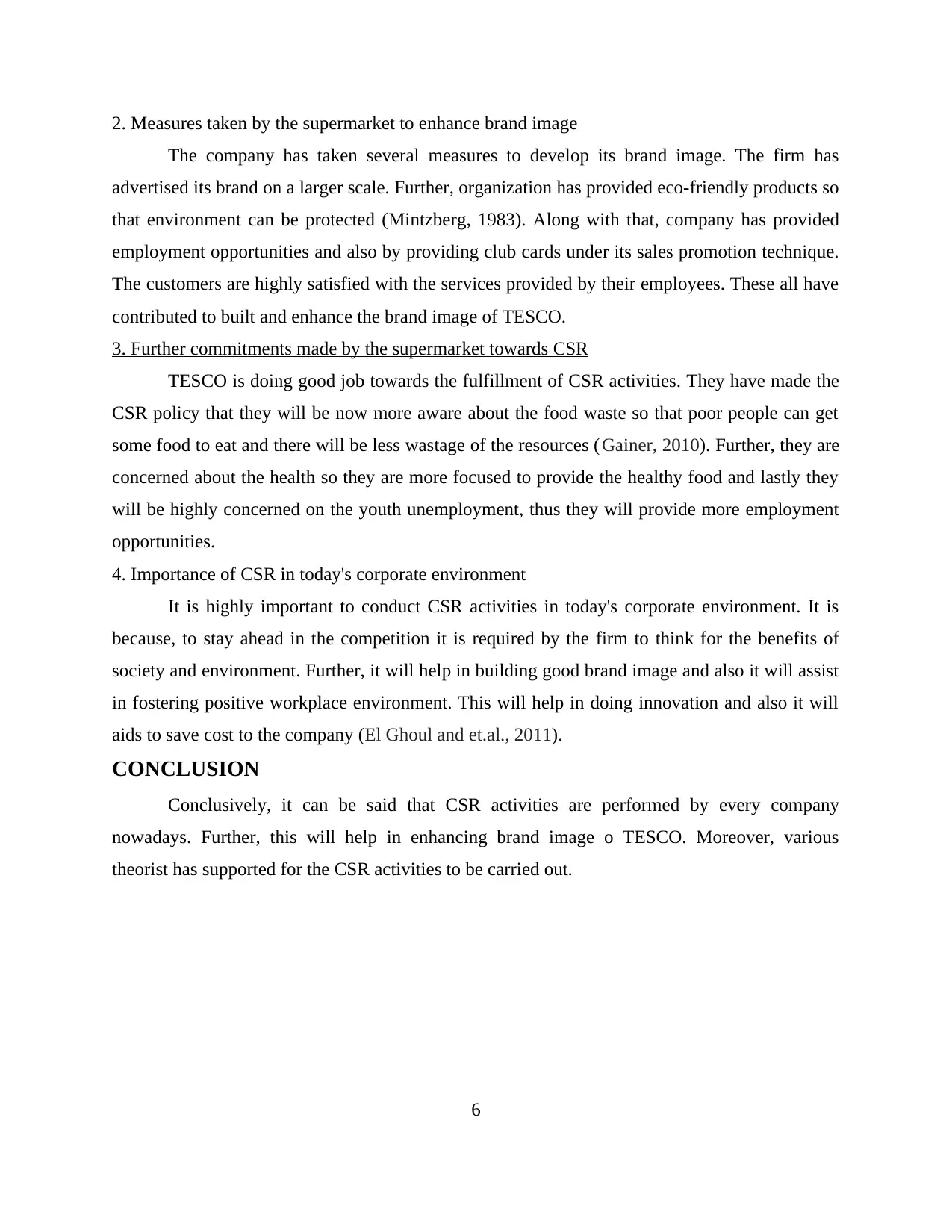
2. Measures taken by the supermarket to enhance brand image
The company has taken several measures to develop its brand image. The firm has
advertised its brand on a larger scale. Further, organization has provided eco-friendly products so
that environment can be protected (Mintzberg, 1983). Along with that, company has provided
employment opportunities and also by providing club cards under its sales promotion technique.
The customers are highly satisfied with the services provided by their employees. These all have
contributed to built and enhance the brand image of TESCO.
3. Further commitments made by the supermarket towards CSR
TESCO is doing good job towards the fulfillment of CSR activities. They have made the
CSR policy that they will be now more aware about the food waste so that poor people can get
some food to eat and there will be less wastage of the resources (Gainer, 2010). Further, they are
concerned about the health so they are more focused to provide the healthy food and lastly they
will be highly concerned on the youth unemployment, thus they will provide more employment
opportunities.
4. Importance of CSR in today's corporate environment
It is highly important to conduct CSR activities in today's corporate environment. It is
because, to stay ahead in the competition it is required by the firm to think for the benefits of
society and environment. Further, it will help in building good brand image and also it will assist
in fostering positive workplace environment. This will help in doing innovation and also it will
aids to save cost to the company (El Ghoul and et.al., 2011).
CONCLUSION
Conclusively, it can be said that CSR activities are performed by every company
nowadays. Further, this will help in enhancing brand image o TESCO. Moreover, various
theorist has supported for the CSR activities to be carried out.
6
The company has taken several measures to develop its brand image. The firm has
advertised its brand on a larger scale. Further, organization has provided eco-friendly products so
that environment can be protected (Mintzberg, 1983). Along with that, company has provided
employment opportunities and also by providing club cards under its sales promotion technique.
The customers are highly satisfied with the services provided by their employees. These all have
contributed to built and enhance the brand image of TESCO.
3. Further commitments made by the supermarket towards CSR
TESCO is doing good job towards the fulfillment of CSR activities. They have made the
CSR policy that they will be now more aware about the food waste so that poor people can get
some food to eat and there will be less wastage of the resources (Gainer, 2010). Further, they are
concerned about the health so they are more focused to provide the healthy food and lastly they
will be highly concerned on the youth unemployment, thus they will provide more employment
opportunities.
4. Importance of CSR in today's corporate environment
It is highly important to conduct CSR activities in today's corporate environment. It is
because, to stay ahead in the competition it is required by the firm to think for the benefits of
society and environment. Further, it will help in building good brand image and also it will assist
in fostering positive workplace environment. This will help in doing innovation and also it will
aids to save cost to the company (El Ghoul and et.al., 2011).
CONCLUSION
Conclusively, it can be said that CSR activities are performed by every company
nowadays. Further, this will help in enhancing brand image o TESCO. Moreover, various
theorist has supported for the CSR activities to be carried out.
6
⊘ This is a preview!⊘
Do you want full access?
Subscribe today to unlock all pages.

Trusted by 1+ million students worldwide
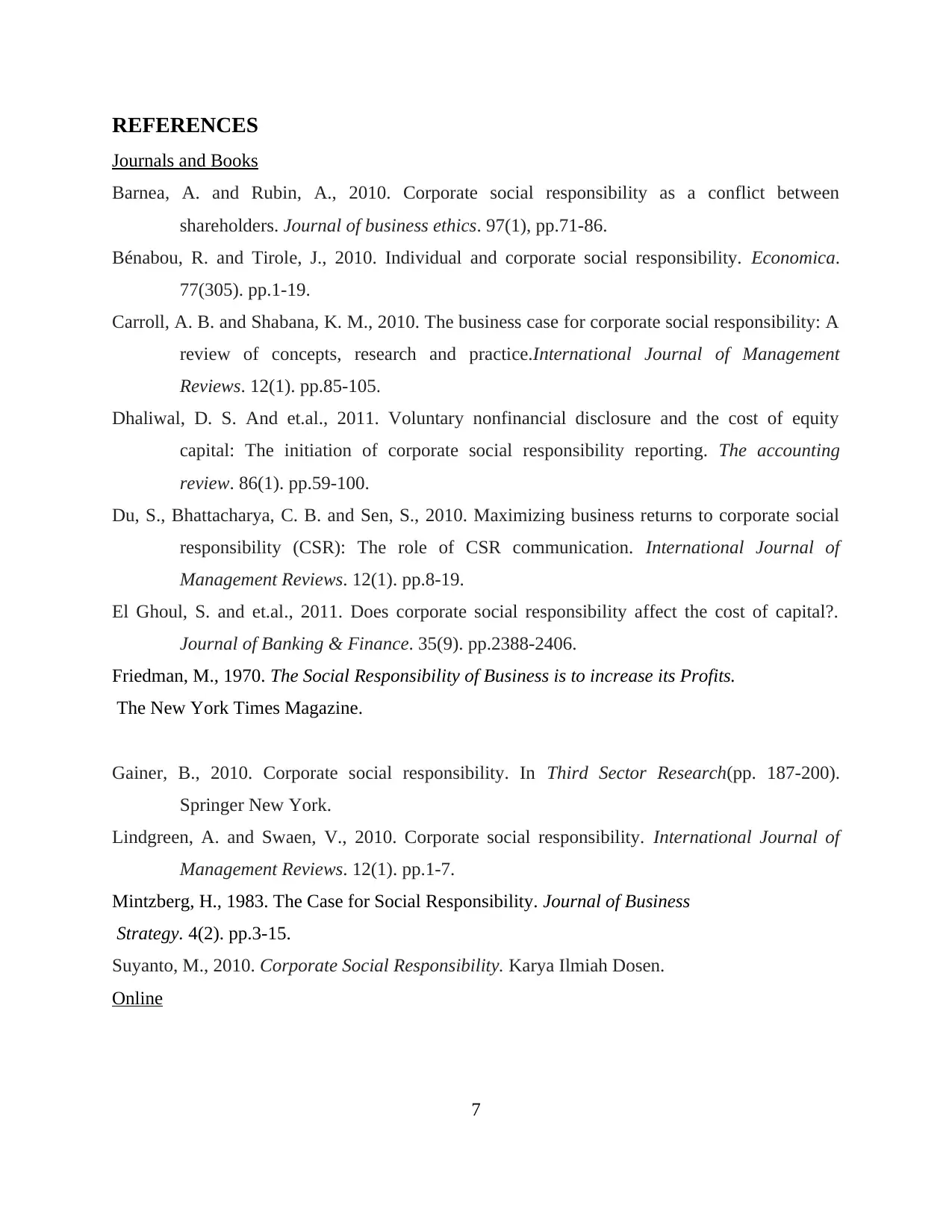
REFERENCES
Journals and Books
Barnea, A. and Rubin, A., 2010. Corporate social responsibility as a conflict between
shareholders. Journal of business ethics. 97(1), pp.71-86.
Bénabou, R. and Tirole, J., 2010. Individual and corporate social responsibility. Economica.
77(305). pp.1-19.
Carroll, A. B. and Shabana, K. M., 2010. The business case for corporate social responsibility: A
review of concepts, research and practice.International Journal of Management
Reviews. 12(1). pp.85-105.
Dhaliwal, D. S. And et.al., 2011. Voluntary nonfinancial disclosure and the cost of equity
capital: The initiation of corporate social responsibility reporting. The accounting
review. 86(1). pp.59-100.
Du, S., Bhattacharya, C. B. and Sen, S., 2010. Maximizing business returns to corporate social
responsibility (CSR): The role of CSR communication. International Journal of
Management Reviews. 12(1). pp.8-19.
El Ghoul, S. and et.al., 2011. Does corporate social responsibility affect the cost of capital?.
Journal of Banking & Finance. 35(9). pp.2388-2406.
Friedman, M., 1970. The Social Responsibility of Business is to increase its Profits.
The New York Times Magazine.
Gainer, B., 2010. Corporate social responsibility. In Third Sector Research(pp. 187-200).
Springer New York.
Lindgreen, A. and Swaen, V., 2010. Corporate social responsibility. International Journal of
Management Reviews. 12(1). pp.1-7.
Mintzberg, H., 1983. The Case for Social Responsibility. Journal of Business
Strategy. 4(2). pp.3-15.
Suyanto, M., 2010. Corporate Social Responsibility. Karya Ilmiah Dosen.
Online
7
Journals and Books
Barnea, A. and Rubin, A., 2010. Corporate social responsibility as a conflict between
shareholders. Journal of business ethics. 97(1), pp.71-86.
Bénabou, R. and Tirole, J., 2010. Individual and corporate social responsibility. Economica.
77(305). pp.1-19.
Carroll, A. B. and Shabana, K. M., 2010. The business case for corporate social responsibility: A
review of concepts, research and practice.International Journal of Management
Reviews. 12(1). pp.85-105.
Dhaliwal, D. S. And et.al., 2011. Voluntary nonfinancial disclosure and the cost of equity
capital: The initiation of corporate social responsibility reporting. The accounting
review. 86(1). pp.59-100.
Du, S., Bhattacharya, C. B. and Sen, S., 2010. Maximizing business returns to corporate social
responsibility (CSR): The role of CSR communication. International Journal of
Management Reviews. 12(1). pp.8-19.
El Ghoul, S. and et.al., 2011. Does corporate social responsibility affect the cost of capital?.
Journal of Banking & Finance. 35(9). pp.2388-2406.
Friedman, M., 1970. The Social Responsibility of Business is to increase its Profits.
The New York Times Magazine.
Gainer, B., 2010. Corporate social responsibility. In Third Sector Research(pp. 187-200).
Springer New York.
Lindgreen, A. and Swaen, V., 2010. Corporate social responsibility. International Journal of
Management Reviews. 12(1). pp.1-7.
Mintzberg, H., 1983. The Case for Social Responsibility. Journal of Business
Strategy. 4(2). pp.3-15.
Suyanto, M., 2010. Corporate Social Responsibility. Karya Ilmiah Dosen.
Online
7
Paraphrase This Document
Need a fresh take? Get an instant paraphrase of this document with our AI Paraphraser

Corporate Social Responsibility. 2016. [Online]. Available through:
<http://www.tcs.com/about/corp_responsibility/corporate-social
responsibility/Pages/default.aspx>. [Accessed on 5th March 2016].
8
<http://www.tcs.com/about/corp_responsibility/corporate-social
responsibility/Pages/default.aspx>. [Accessed on 5th March 2016].
8
1 out of 8
Related Documents
Your All-in-One AI-Powered Toolkit for Academic Success.
+13062052269
info@desklib.com
Available 24*7 on WhatsApp / Email
![[object Object]](/_next/static/media/star-bottom.7253800d.svg)
Unlock your academic potential
Copyright © 2020–2026 A2Z Services. All Rights Reserved. Developed and managed by ZUCOL.





